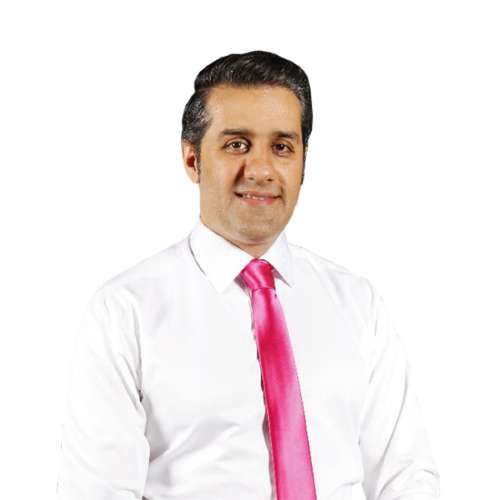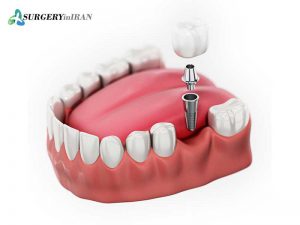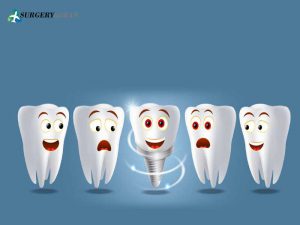DENTAL IMPLANT
In what cases can dental implants be used?
Who has restrictions on dental implants?
Complications and possible risks of dental implants
What care is needed after a dental implant?
Many people lose some of their teeth over time and age and are forced to pull their teeth due to excessive decay. This not only does not look good and reduces human self-confidence, but also causes problems in chewing food and consequently in the digestive system. In the past, dental prostheses or artificial teeth were used to solve this problem, which caused problems for the person, but today, with the advancement of dental science, dental implants are used. Dental implants have many advantages over dentures, so they are very common, and people who have lost their teeth for any reason use this method. The use of implants does not cause any problems or complications for the person and the person can use the implant for the rest of his life without the slightest problem. As the title of the article suggests, we are going to provide information about implants and their benefits and steps, so if you are also planning to use dental implants, we suggest you read this article to the end.
What is a dental implant?
The implant consists of a metal screw that is placed in the patient’s jawbone and is the root of the tooth and for the appearance of the tooth of a denture, it is placed on this screw and brings the real view of the tooth to the person.
As we said, dental implants consist of two main parts, which are: abutment and fixture.
A fixture is a part that is inserted into a patient’s jaw, and an abutment is a part that is placed outside the gums and a prosthesis is placed on it. The base of the implant is made of titanium because it is more compatible with the human jawbone. Due to its great compatibility with the jaw structure, the implant does not cause damage to the jaw bone, make noise, and slip.
In what cases can dental implants be used?
- In cases where a person has lost all of his front and back jaw teeth.
- In cases where a person has lost one of his front teeth and the distance created from the side teeth is normal.
- If a person has lost more than one tooth and the distance between the side teeth is normal.
- If a person has lost one or more teeth at the end of their dental arch and has only normal teeth on one side.
Dental implants are suitable for all people who for any reason cannot use dentures.
There is no age limit for using dental implants, and anyone who has a missing tooth can use a dental implant to replace their tooth.
Everyone can use dental implants after adulthood. For example, if a person has lost his or her permanent teeth as a result of an accident or accident as a child, he or she can use dental implants in adulthood to fill in the gaps. As we said, everyone can use implants, but there are exceptions that we will mention in the following.
Who has restrictions on dental implants?
- People who suffer from tooth and jaw infections should not have implants. These people should first try to eliminate the problem of tooth and jaw infections and then have dental implants because in such cases, not only implants are painful from It does not cure but it adds to their problems. Therefore, the tooth and jaw infection must be eliminated first, then the dental implant must be started, and if this issue is not neglected, the implant must be removed, which leads to more costs for the patient and more effort for the dentist.
Special precautions should be taken before implantation for people with diabetes. Before having an implant, the blood sugar of these people should be checked by a doctor, and if the person’s diabetes is controlled, there will be no problem in having the implant.
Smokers and people addicted to tobacco should discuss this with their doctors. To have an implant, such individuals must stop smoking for a while.
- People taking aspirin and anticoagulants should stop taking these drugs 5 to 7 days before the implant and under the supervision of their doctor.
- People who have had radiology, especially in the maxillofacial area, as well as people who have received long-term bisphosphonate treatments should not have implants.
Pregnant women are among those who should not have dental implants, and doctors are completely opposed to implants during pregnancy and avoid them as much as possible.
Benefits of dental implants
- Implants fill the gaps in the missing teeth, so it brings a more beautiful appearance and a more pleasant smile to the person, thus increasing the person’s self-confidence.
Dental implants are a quick way to replace a new tooth with a lost tooth, and if a person does not have a physical or jaw health problem, they will get the desired result quickly.
- One of the most important advantages of implants is their high durability and long life, which is why it has become one of the most popular methods among doctors and patients. If oral hygiene is fully observed, the implant will maintain its efficiency for the rest of its life.
Complications and possible risks of dental implants
As we have said, implant placement is an almost uncomplicated procedure, even for non-specialists and non-specialists the paste may carry the following potential hazards. Therefore, choosing a competent dentist will significantly reduce these risks. Complications and risks of implants include:
- Damage to the side teeth
- The possibility of infecting the implant site
- The possibility of damage to the nerves of the teeth, which may cause numbness, pain, tingling in the patient’s lips, chin, and gums.
- May cause sinus problems for the patient.
Steps of dental implants
Dental implants are usually performed without anesthesia and are so-called outpatient. The steps of implant placement are as follows:
- Patient examination
- Extract damaged and decayed teeth if needed
- Bone grafts if needed
- Placing the implant base inside the patient’s gums
- Molding of the patient’s jaw and teeth and sending it to the laboratory
- Perform the final stage of the implant
What care is needed after a dental implant?
- It is forbidden to brush for one day after the implant.
It is forbidden to rinse the mouth for up to 8 hours after the implant.
Avoid drinking coffee and tea and smoking for up to 3 days after the implant.
- Do not use drugs or alcohol after the implant because it will prevent the implant from being complete and successful.
- After the implant, you should use dental floss and implant toothpaste.
- There is nothing wrong with drinking water after the implant, but you must wait for the food to go away before your numbness goes away.
- Do not drink with a straw for at least 2 weeks after the implant.
- Do not eat or drink hot foods or liquids after the implant.
Do dental implants hurt?
Dental implants are usually easier than tooth extraction and can be done with simple anesthesia, after which you will not feel any pain, while after tooth extraction you will feel pain for a long time. But if you have pain, talk to your dentist to prescribe a painkiller.
What happens in the patient’s mouth and teeth after the implant?
After the implant is placed in the patient’s jaw, the jawbone must be welded and combined with it. This usually takes several months and varies from person to person.
If you have one or more cavities in your jaw, a temporary denture or denture may be made for you, but if you used a complete denture before, it will be placed in your jaw after the implant base is placed. You can use your previous prosthesis, but some modifications must be made to it so that it is suitable for your use and does not damage your implants. This usually uses a healing cup, which is a cap that is placed on the implant to protect it.
How to clean implanted teeth?
If you want your implants to work for you and last a lifetime, then you must maintain good oral hygiene. It is especially important to observe the health and care of implants during recovery. Your dentist will advise you on implant care that you should follow. Implanted teeth are not harder to clean than your primary teeth.



















